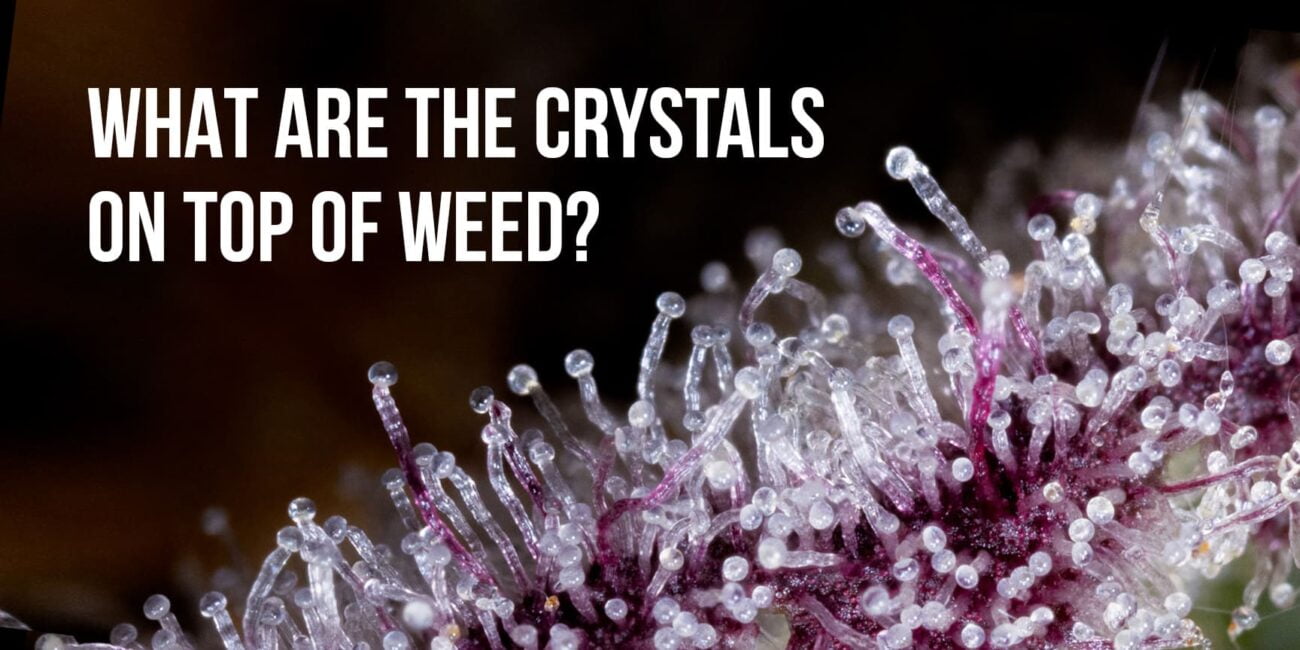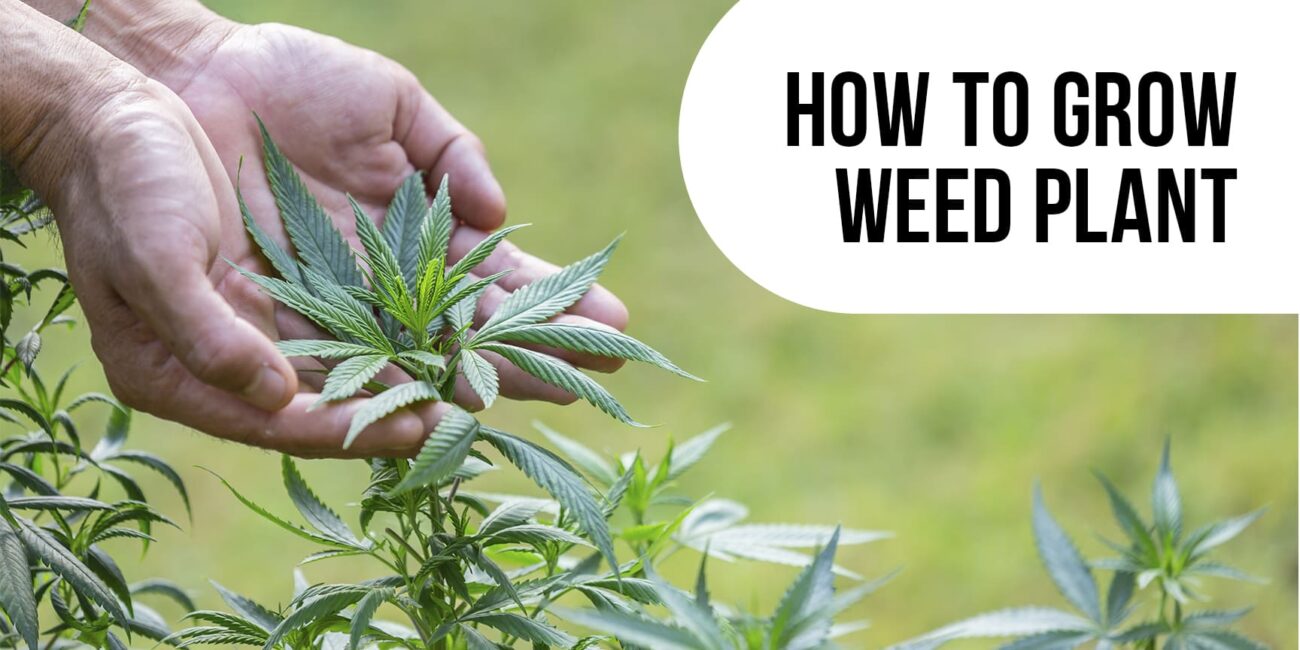Hash vs Weed

In the world of cannabis, the choice: hash vs weed has long been a topic of discussion among enthusiasts. Both products originate from the cannabis sativa plant and contain the psychoactive compound delta-9-tetrahydrocannabinol (THC), which determines their potency and the high they produce.
While hash is a concentrated form of cannabis, weed refers to the traditional plant material. Understanding the similarities and differences between these two options is essential for making informed decisions and exploring the diverse effects and flavors they offer.
Hashish is a concentrated cannabis product created by collecting the resinous trichomes that coat the flowers and leaves of the cannabis plant. These trichomes contain high levels of THC, the psychoactive compound responsible for the plant’s effects.
To produce hashish, the trichomes are gathered and compressed into a solid, paste-like form. The resulting product has a darker color compared to traditional marijuana, ranging from dark brown to green or dark blonde.
The process of making hashish has a long history, dating back centuries. In recent times, the “bubble hash” method has gained popularity, which involves using ice water to separate the trichomes from the plant material.
You can also read our article “Cannabis: smoking vs edibles”
Does hash give you a different high?
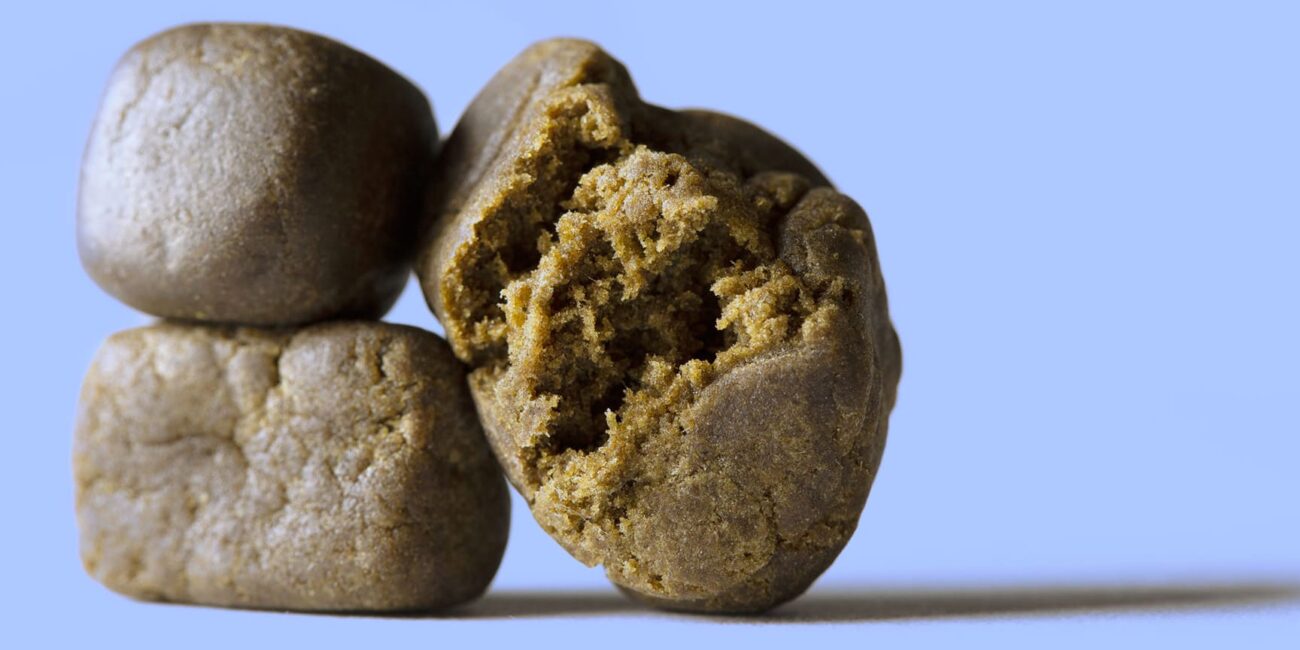
When comparing smoking hash vs weed, it’s important to note that they can produce different effects. Generally, well-made hashish tends to have a stronger impact than the cannabis plant it originates from.
However, it’s worth mentioning that not all hashish falls into this category. Lower-quality forms may contain undesirable substances such as sand, henna, plastic, oil, or even animal hair or dung.
As a general rule, hashish is a more concentrated form of cannabis. In regions where outdoor cannabis has lower cannabinoid levels, hashish became the primary method of consumption due to its higher potency. Achieving a noticeable effect with hashish typically requires a smaller amount compared to the plant itself.
The high experienced from both hash and weed is influenced by the strain of cannabis used. While the psychoactive elements of hashish should reflect those of the parent plant, there may be some subjective differences in the nature of the effects compared to weed.
For instance, many people describe hashish as producing a clearer, more cerebral effect, even if the parent plant induces a more relaxed and sedative effect.
In terms of taste, hashish often exhibits an earthier profile and is perceived as less floral compared to the parent plant. However, the taste can vary depending on the extraction method employed and the amount of plant material present in the hashish.
Effects: Weed vs Hash
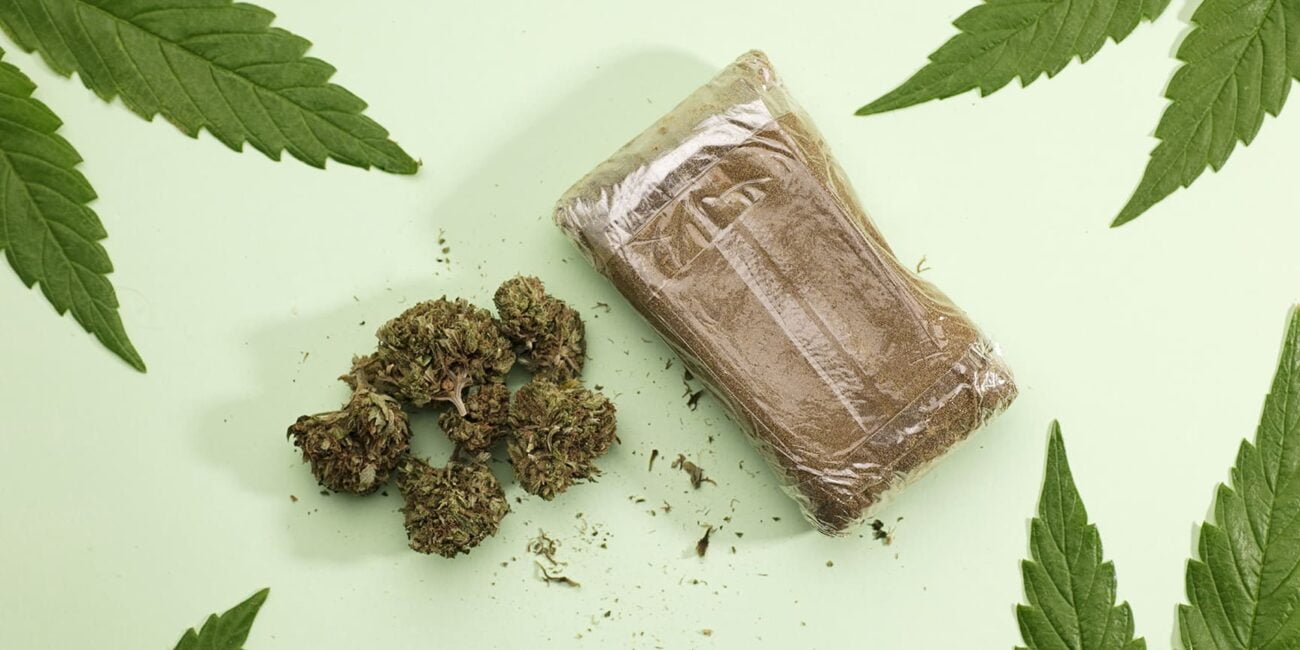
After familiarizing yourself with the information above, you might question the long-standing belief that hash typically induces “stoned” effects while weed tends to create a “high.”
Feeling “stoned” often involves a relaxed body buzz accompanied by a mellow state of mind. On the other hand, being “high” tends to encompass more stimulating sensations, sparking creativity and leading to more psychedelic experiences, often characterized as a head buzz.
Interestingly, hash and weed can both originate from the exact same strains of cannabis. The relative levels of cannabinoids remain consistent between the two products, although their concentrations may differ. Hash tends to be more concentrated, resulting in greater potency.
The primary distinction between weed and hash lies in the higher concentration found in the latter, leading to more distinct flavors and effects.
The notion that hash and weed inherently produce different effects turns out to be somewhat of an urban myth. However, it’s not difficult to understand why this belief arose. Traditional hash strains often contain higher levels of CBD.
This suggests that the perceived differences between weed and hash are influenced more by the ratios of CBD to THC.
CBD, as a cannabinoid, has the ability to partially mitigate the effects of THC. In a sense, CBD tends to provide a soothing effect on the mind while THC triggers it instead.
To summarize, while hash and weed may exhibit variations in concentration and flavors, the effects experienced are not inherently distinct. The CBD:THC ratios play a role in modulating the overall experience, with CBD imparting a calming influence and THC eliciting a more stimulating response.
If you decide to try weed, we can recommend you Alien OG [Indica Dominant] — Double Blunt or Marshmallow OG [Indica Dominant] — Blunt
How Are Hash and Weed Similar?
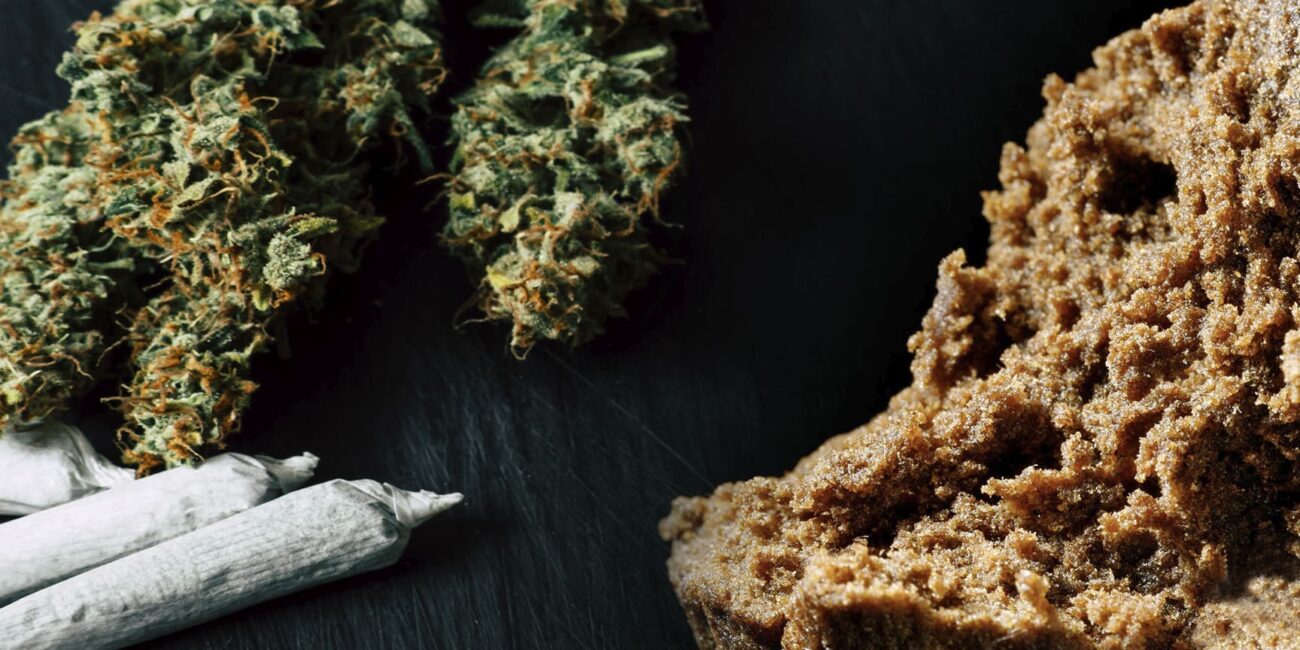
Both hash and weed derive from the Cannabis sativa plant, which harbors a rich array of chemical compounds. Among these compounds, delta-9-tetrahydrocannabinol (THC) plays a significant role in producing the desired recreational effects.
THC-9 is responsible for the psychoactive properties of cannabis. And it is a key factor in determining the potency and intensity of the resulting high.
With over 400 chemical compounds found in cannabis, the levels of THC-9 present in a cannabis greatly influence its potency.
When it comes to comparing hash and weed, both contain THC-9. But hash tends to have a higher concentration of this compound. This elevated concentration of THC-9 in hash is the result of a specific extraction process. That selectively removes and concentrates the resin paste.
As a consequence of its higher THC content, hash generally produces more intense psychoactive effects compared to weed. The concentrated resin paste in hash packs a potent punch, amplifying the mind-altering experience for those who consume it.
The increased concentration of THC in hash can lead to a stronger and more profound high.
It is important to note that while the THC content in hash is higher, the overall effects can still vary. It depending on factors such as tolerance, dosage, and individual sensitivity..
Additionally, other compounds present in cannabis, may also influence the overall experience and contribute to the characteristics of different strains.
Hash vs Weed: A Matter Of Taste?
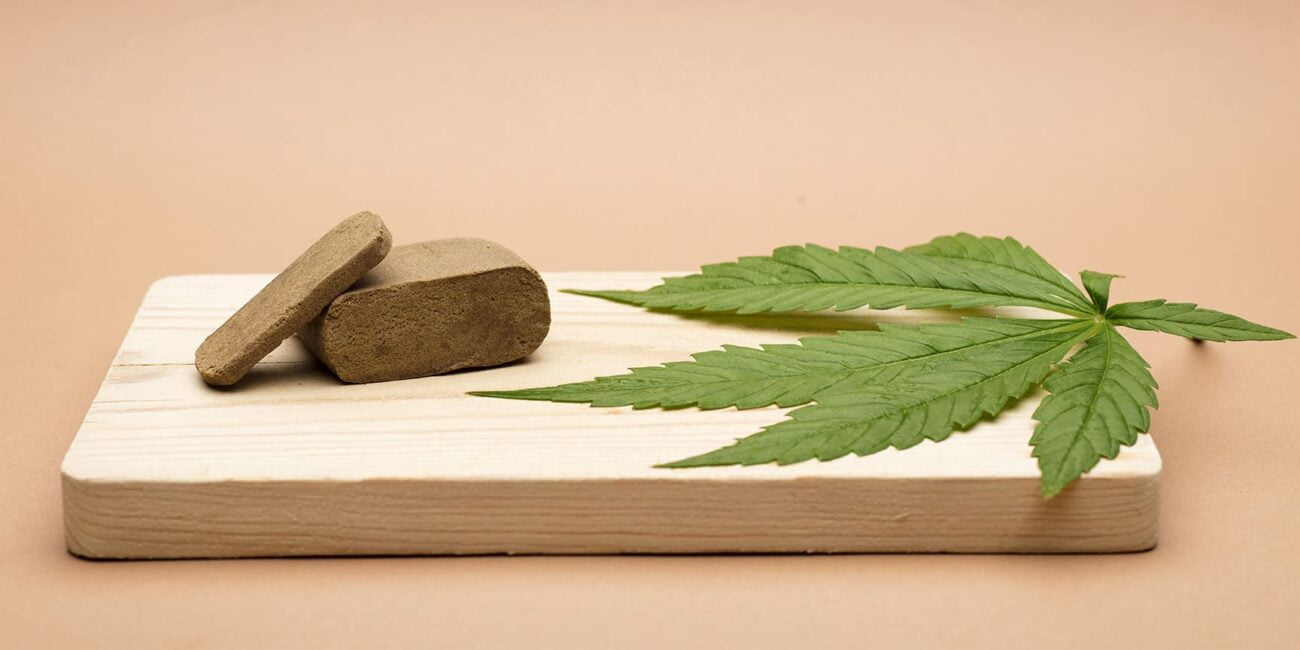
In earlier times, people had a limited choice between weed and hash. And it pales in comparison to the wide range of cannabis strains available today. Typically imported and made from traditional strains, hash offered connoisseurs the anticipated relaxed and stoned effects.
However, in today’s market, the abundance of strains and options can often be overwhelming for consumers. To make an informed choice, it is advisable to focus on the THC and CBD values of available strains. High THC strains, usually starting at around 15% THC, may have weaker effects if they also contain 2% CBD.
Furthermore, the dominance of sativa or indica in weed and hash strains can contribute to the type of high experienced. Sativa-dominant strains tend to produce more activating highs, while indica-dominant types may offer a more sedating experience.
Additionally, the entourage effect, which involves the interplay of various cannabinoids and terpenes, adds unique nuances to the overall effects.
Amsterdam Genetics acknowledges the significance of CBD and THC percentages, along with other components, by providing detailed information in their cannabis seeds catalogue entries.
Dispensaries also recognize the importance of these percentages, and knowledgeable budtenders can provide further insights.
It is crucial to consider dosage as a decisive factor in the effects of both weed and hash. Moreover, potency can vary between harvests and individual plants, making it difficult for even experienced growers to predict the exact outcome.
Nonetheless, the natural nature of both weed and hash remains part of their charm. Thankfully, there is an abundance of exceptional genetics available, ensuring that whether one’s preference leans towards hash or weed, there are plenty of great options to choose from.
Have you chosen weed? Then we recommend that you familiarize yourself with Double Blunts.
In conclusion, the choice: hash vs weed is a matter of personal preference and desired effects. While hash is a concentrated form of cannabis with higher levels of THC, weed offers a more traditional experience.
Both options have their unique characteristics and flavors, influenced by the strain, CBD:THC ratios, and others. Whether you prefer the intense potency of hash or the diverse range of strains available in weed, the world of cannabis provides something for everyone.
With careful consideration of THC and CBD values, along with factors like dosage and individual sensitivity, cannabis enthusiasts can navigate the vast array of options and find the perfect choice for their needs.
So, whether you embark on a hash journey or explore the world of weed, enjoy the natural wonders and effects that this fascinating plant has to offer.


